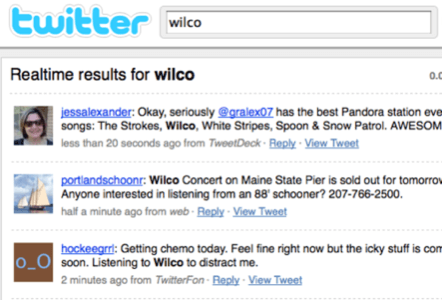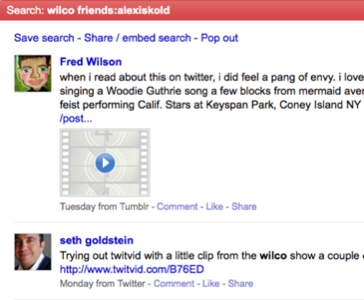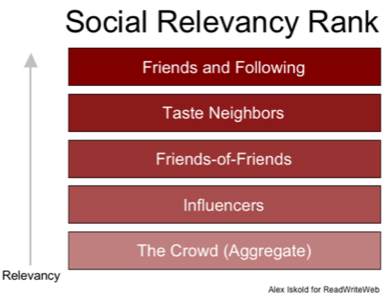FriendFeed has recently launched a search feature, and so Facebook search must be coming soon.

Real-time Web search (of streams of activities) is a hot topicrightnow. Everyone, including Google and Microsoft, recognizes the value of using trusted contacts as filters. What was once called social search is now called real-time search, but this time it will really happen. First, it will be applied to streams and then to the Web in general.
What we are about to get is a Social Relevancy Rank. Whenever you search streams of activity, the results will be ordered not chronologically but by how relevant each is to you based on your social graph. That is, people who matter more to you will bubble up. How does this work? Well, there will be a formula, just as there is a formula for Page Rank.
Solution 101: Rank by Friends and People You Follow
Here is an idea so obvious that it is surprising Twitter has not implemented it already: front-load search results with people you follow. When you search for, say, “Wilco” on Twitter today, the results are in the chronological order. That is not really relevant because you do not know who most of these people are. But if instead you could see people you follow, the search results would be much more useful.

This is not possible on Twitter today, but it already works great on FriendFeed. There, results are filtered or ranked based your social graph. This is not difficult for FriendFeed to do because, on the one hand, it knows who you care about and, on the other, it applies its advanced feed search technology to your social graph:

This sounds awesome, but there is a problem. “Wilco” works well as a query because the band has just released a new album, but many other queries would return no results. Simply put, your friends on Facebook and people you follow on Twitter can’t possibly have an opinion on every topic you may be interested in. This is a problem of sparse data: trusted opinions are scarce.
Small Worlds and Taste Neighbors
To solve the problem of sparse data, we need more data… obviously. One possible solution is to incorporate other sources that you trust (i.e. broaden your social graph). As a next step, search results could rank people you may not be directly following but who are being followed by people you follow. Or in Facebook-speak, friends of friends. You could argue that you are not familiar with their opinions and so cannot yet trust them, but given the small world phenomenon, their contributions are often just as valuable.

Another step could be to include people with similar tastes, so-called taste neighbors. This approach is common among vertical social networks such as Last.fm, Flixster, and Goodreads. These networks have ideas about which people, other than your friends, are like you. However, this is a costly calculation and takes time. In order for Twitter to do something like this, it would have to compare people based on links or perform semantic analyses of tweets over time. Yet even though this is a difficult problem, it will be solved in time.
The Influencers and the Crowd
Aside from using the “second degree” of your social graph or taste neighbors, a Social Relevancy Rank could front-load influencers. In the absence of any other metric, someone who is followed by hundreds of thousands of users is likely more relevant to you than someone you don’t know at all. Using number of followers as a weight might be a good way to order the rest of the activity stream.

In general, combing through countless tweets from strangers is not terribly useful anyway. Just as people have stopped looking at anything beyond the first page of results on Google, sifting through pages of tweets in chronological order gets tedious quickly. What needs to be incorporated into the Social Relevancy Rank is the aggregate sentiment of the crowd: a score that tells you yay or nay and gives you an opportunity to drill into more results if you choose.
The Quest for the Perfect Filter
There is no such thing as a perfect formula. Even Page Rank isn’t perfect. Yet we all use it and find it useful. Much as Page Rank has been adapted and tuned to search the web, Social Relevancy Rank will evolve over time to help us make sense of endless streams of activity. This ranking will have a profound impact on how we tap into our friends’ opinions.

It will change the face of general Web searches in time, too. Today, results are automatically ranked by relevancy and freshness. Once Social Relevancy Rank is factored in, search results will be re-ordered based on social relevancy.
And now, as always, please tell us what you think? What would you expect from a search engine with Social Relevancy Rank built in?










